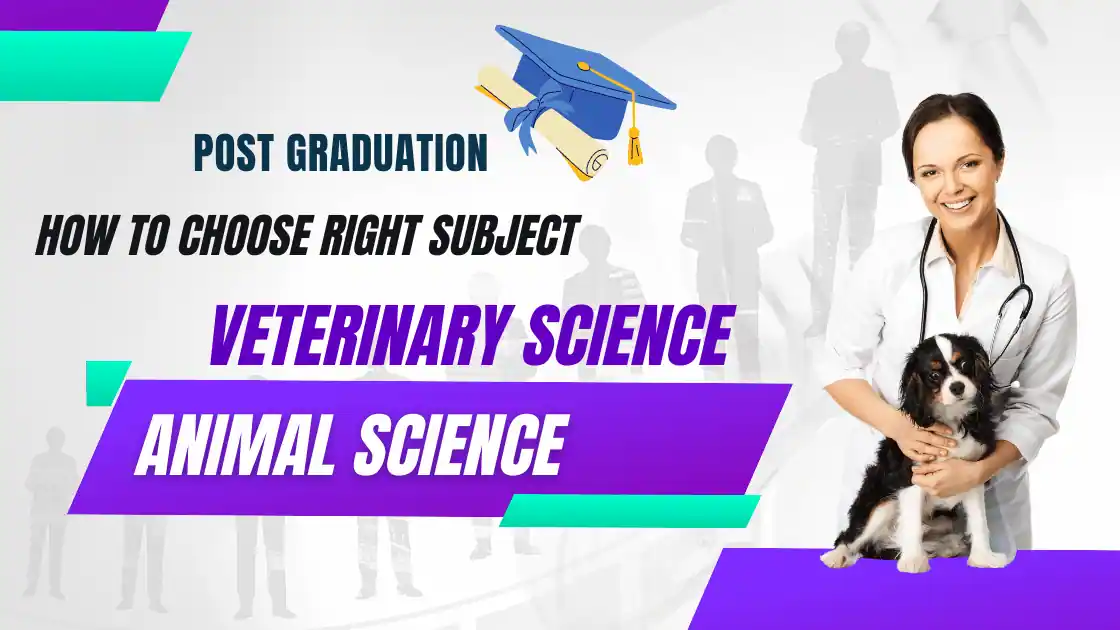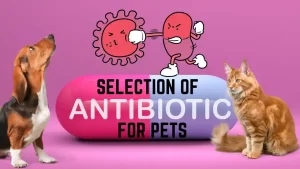Veterinary Science or Animal Science
How to Choose a Subject for Post-Graduation
Choosing a subject for post-graduation in veterinary education is an important decision, as it will shape your career and determine the areas in which you can specialize. There are two available main streams after graduation i.e. veterinary science and animal science.
Subjects of Veterinary Science are
- Veterinary Anatomy/Anatomy & Histology,
- Veterinary Gynaecology and Obstetrics/Ani. Reproduction,
- Veterinary Medicine (Clinical/Preventive),
- Veterinary Parasitology,
- Veterinary Pharmacology and Toxicology,
- Veterinary Pathology,
- Wildlife Science/ Wildlife Health Management,
- Veterinary Virology,
- Veterinary Immunology,
- Veterinary Microbiology & Immunology/Bacteriology,
- Veterinary Surgery & Radiology,
- Veterinary Public Health & Epidemiology/ Veterinary Public Health/ Epidemiology/ Epidemiology & Preventive Medicine
Subjects of Animal Science are
- Animal Husbandry/Dairy Science,
- Animal Genetics & Breeding,
- Animal Nutrition,
- Veterinary/Animal Physiology,
- Livestock Production Management,
- Livestock Products Technology,
- Poultry Science,
- Veterinary & Animal Husbandry Extension,
- Livestock/ Veterinary/ Animal Husbandry Economics, Bio-Statistics.
Subjects can be decided according to the interest from -
Clinical Veterinary Subjects like –
- Animal Reproduction Gynaecology and Obstetrics,
- Veterinary Surgery and Radiology,
- Veterinary Medicine
Veterinary Paraclinical Subjects like –
- Veterinary Microbiology,
- Veterinary Parasitology,
- Veterinary Pathology,
- Veterinary Pharmacology and Toxicology,
- Veterinary Public Health and Epidemiology
Veterinary Non-clinical or Basic Veterinary Science like –
- Veterinary Anatomy,
- Veterinary Biochemistry,
- Veterinary Biotechnology,
- Veterinary Extension Education,
- Veterinary Physiology
Animals Production Sciences like –
- Animal Genetics and Breeding,
- Animal Nutrition,
- Livestock Production and Management,
- Livestock Products Technology,
- Poultry Science
You are going to invest your time and money both for the post-graduation program so here are some points you can consider if you want to choose the right subject for you:
1. Your Interest:
First of all, always consider your areas of interest within the field of veterinary medicine, and think about subject if you will be able to make something from it. You can choose clinical, non-clinical or paraclinical subjects according to your interest.
2. Research About Available Programs:
Look at the programs offered by veterinary universities or schools/ colleges, and research the subjects that they offer. Don’t forget about the options and courses abroad. This will give you a better idea of what is available and what you can study. Always choose programs that offer opportunities to participate in research projects, attend conferences, and publish your findings in reputed or peer reviewed journals.
3. Consider your career goals:
Think about your future career goals, and choose a subject that will help you achieve them. For example, if you are planning to open a clinic then specialize in a particular area of veterinary medicine like surgery or internal medicine. If you are good in public dealing and love traveling then can think about subjects like pharmacology or nutrition and working in pharma/nutraceutical companies. If you are an introvert and can spend hours on microscope, think about pathology, microbiology or parasitology. You should keep these things in your mind while choosing a post-graduation program.
4. Seek advice from alumni, mentors and peers:
To take a fair idea talk to your professors, peers, alumni and colleagues in the veterinary medicine field, and ask for their advice on what subject to choose. They may have valuable insights of the subject and scope that can help you make an informed decision. These people can provide support and guidance throughout your career.
5. Consider the cost:
The cost of post-graduation programs can vary significantly according to the location or institute /university, so be sure to consider your budget when making your decision. So, in this case prefer looking for programs that offer financial aid, scholarships, or other forms of financial support like part time jobs or fixed working hours, if needed.
6. Consider the reputation of the program and institute:
Before joining or deciding the subject, research the reputation of the post-graduation programs and institute both you are considering. Look for programs that are accredited by reputable organizations or regulating bodies, and look for job-oriented programs that are known for producing high-quality graduates who are well-prepared for careers or jobs in veterinary medicine.
One more thing to consider is looking for programs that have state-of-the-art laboratories, equipment, and technology, and that provide ample opportunities for hands-on learning and trainings.
It becomes more important in case if you are choosing a course / institute outside of your country / province.
7. Consider practical training opportunities:
Choose post-graduation programs that often include hands-on training opportunities, such as internships, externships, or clinical rotations. Consider the practical training and learning opportunities offered by the program you are interested in, as well as the facilities and resources available for the same.
8. Consider the location:
Location of the institute you are interested in for the post-graduation, and think about the resources available in that area. For example, if you are interested in working with a particular species of animal or topic, you may want to consider an institute that has resources and receives a good number of cases of that species (viz., for wild life or exotics choose the institutes located near zoos, wildlife rehabilitation centres, or other facilities that specialize in that species).

9. Consider the length / duration of the program:
Master’s degree programs are of two years duration in most of the institutes. Some post-graduation (certifications/ diplomas etc.) programs may vary in duration so consider the length of the post-graduation program you are interested in. Some programs are shorter and more focused, while others may be longer and more comprehensive.
10. Consider the curriculum:
If you are concerned more about the learning then take a look at the curriculum of the post-graduation programs you are considering, and make sure that it covers the important subjects or topics of your interests. Pay attention to the coursework, electives, minor subjects and practical training opportunities available in each program.
Extracurricular activities are also important part of the program so look for programs that offer opportunities to participate in student organizations, volunteer opportunities, and other activities that can help you develop your skills and network with others in your field.
11. Consider the faculty:
Research about the faculty of the institute / post-graduation program. Look for programs that have experienced, knowledgeable, and well-respected instructors in the subject of your interest. You can reach out to the current students, alumni of the course and can know about their experiences about the programs and instructors both.
12. Consider the support services:
In case you are going to choose an institute that is situated in other countries consider the support services that are available through the post-graduation program for its fellows in form of career counselling, academic advising, part time job opportunities for financial support and tutoring. Look for programs that have a strong track record of helping students succeed.
13. Consider the job market and long-term impact:
Your choice for the program will have long term impact on your career. A job oriented; skilful program of your interest will help you in getting opportunities more easily. Research the job market and choose the specialization /program in demand (current / near future). Look for programs that have strong connections to employers and that can help you find job opportunities after post-graduation.
We have tried our best to summarize the factors so that you can make an informed decision about the post-graduation program that is right for you, and that will help you achieve your goals in the field of veterinary medicine.
Ultimately, the subject you choose should align with your interests, career goals / job opportunities, and areas of expertise, and it should provide you with the training and skills you need to succeed in your future career.
Wish You Best of Luck





